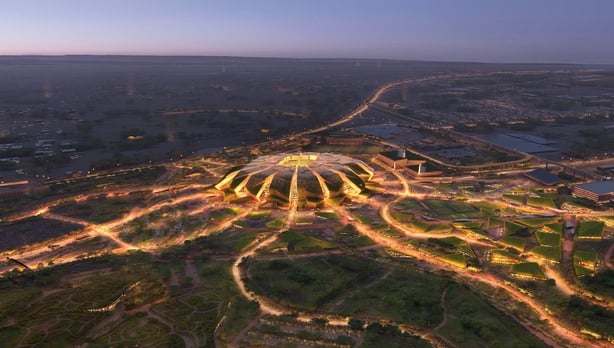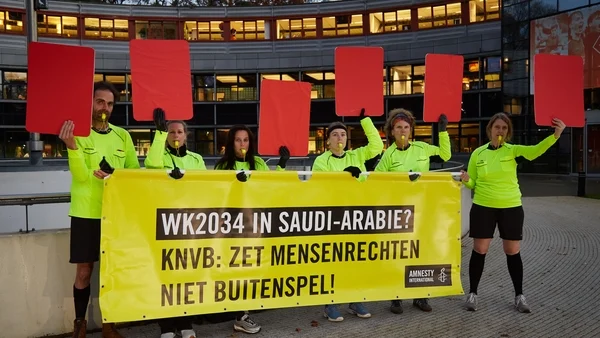Saudi Arabia's bid to host the 2034 men’s World Cup has been deemed 'medium risk’ for human rights in FIFA’s evaluation report, amid warnings migrant workers will die in preparing the country to stage the tournament.
The document also leans towards the likelihood of a second World Cup played in the winter – during the regular European club season – as was the case for Qatar in 2022 when the finals were played in November and December.
The bid also secured a record score of 419.8 out of 500, better than 2026 hosts Canada, Mexico and the United States.
The bid evaluation report has been published by FIFA ahead of a vote by its member national associations on 11 December, where Saudi Arabia are the sole bidders.
FIFA has been accused of an "astonishing whitewash" by Amnesty.
The Saudi bid was deemed medium risk on human rights criteria, despite warnings from Amnesty International that migrant workers will die in preparing the country to host the tournament without huge reform.
It was also deemed low risk on sustainability and environmental protection.
The record score was also awarded despite no clarity on when the tournament could be played, with the report highlighting daytime temperatures in the capital Riyadh being in excess of 40 degrees Celsius in the traditional World Cup months of June and July.
"FIFA’s evaluation of Saudi Arabia’s World Cup is an astonishing whitewash of the country’s atrocious human rights record," Amnesty’s head of labour rights and sport Steve Cockburn said.
"The sports body has decided to ignore the clear evidence of worker exploitation, legalised discrimination and severe repression, and press ahead with a predetermined decision.
"At every stage of the process, FIFA has ensured that nothing would stand in the way of Saudi Arabia hosting the 2034 World Cup and it has effectively discarded its human rights policies to achieve this end.
"Unless huge human rights reforms are introduced, people will be exploited, evicted from their homes and even die as a result."
A separate report concerning the plight of migrant workers at the 2022 World Cup in Qatar was also finally published late on Friday – 11 months after it was completed.
It found FIFA and other organisations – including the Qatari state – had a "shared responsibility" to compensate labourers and the families of those who had died in construction projects in the country.

Earlier this week, Amnesty said it was "shameful" that a $50 million 2022 World Cup legacy fund would not directly compensate migrant workers.
Saudi's medium risk score on human rights in the 2034 evaluation report came despite the country’s criminalisation of same-sex relationships and freedom of expression.
The report acknowledges the "significant effort and time" needed to implement reforms but added: "There is a good potential that the tournament could serve as a catalyst for some of the ongoing and future reforms and contribute to positive human rights outcomes for people in Saudi Arabia and the region that go beyond the scope of the tournament itself."
It added: "Addressing potential gaps with respect to freedom of expression would likely take significant effort and time.
"However, the event-time measures to guarantee these rights provide a basis for implementation by 2034."
The report acknowledges the "complexities" around event timing, and raises the very real prospect of another winter World Cup requiring leagues operating on an August to May pattern to take a mid-season break.
Whether domestic leagues, already involved in legal action against FIFA over its fixture calendar, would accommodate that remains to be seen.
On the environment, a low-risk score was awarded despite the report highlighting the "material" impact of the extent of construction required to get Saudi Arabia ready. It said the bid "provides a good foundation for delivering mitigation measures to address some of the environment-related challenges".
Earlier this year FIFA agreed a four-year sponsorship deal with Saudi oil and gas company Aramco worth a reported $400m.
The Saudi state directly or indirectly owns almost 98% of the shares in Aramco, which environmental organisation Client Earth has identified as the biggest corporate greenhouse gas emitter in the world.
"Addressing potential gaps with respect to freedom of expression would likely take significant effort and time," the report states.
"However, the event-time measures to guarantee these rights provide a basis for implementation by 2034."
The prospect of a winter finals is also strong. The report highlights that daytime temperatures in the capital Riyadh in June and July, when the finals are traditionally played, exceed 40 degrees Celsius. Event timing is also scored as ‘medium risk’ as a consequence.
"Taking into consideration local climatic conditions as well as the local calendar of sporting and cultural events taking place in 2034, the exercise of identifying the optimal window for the competition brings with it some complexities," the report states.
"Nevertheless, the substantial lead-in time to arrive at a men’s international match calendar for 2034 and the flexibility and spirit of collaboration demonstrated by the bidder serve as partially mitigating factors."




